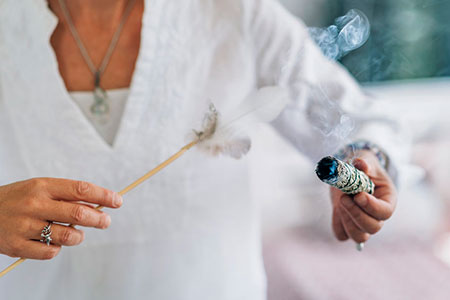guilt
Paranormal Activity, Or Energy Residue?
 Clients sometimes ask me to do an energy clearing in their homes or businesses. In have even been asked to do a cleansing in stables, where the horses had been inexplicably out of sorts and acting out of character. The energy clearing methods I use vary from the more typical Western techniques to traditional African methods that I learned while living there.
Clients sometimes ask me to do an energy clearing in their homes or businesses. In have even been asked to do a cleansing in stables, where the horses had been inexplicably out of sorts and acting out of character. The energy clearing methods I use vary from the more typical Western techniques to traditional African methods that I learned while living there.
One of the most memorable clearings I ever did was for a long-standing client who struggled with a deep sense of guilt over the suicide of her late husband. She had asked me to do an energy clearing ritual in her home, to see what I could pick up.
Her husband had ended his life sitting in a large, plush wingback chair in their home, where they were bringing up their two young children. Apparently, they had argued a lot in the weeks leading up to his death, particularly after he’d discovered her affair with another man.
Guilt overwhelmed her, and her late husband’s family made their judgment of her very clear. They felt his passing was her fault.
In a mediumship reading I did for her, her late husband had come through with messages that proved he had crossed over to the Other Side, that he was at peace, and that she was never to blame for him choosing to depart from this life. Instead, he spoke of his own life-long battle with depression, and his personal failures in their broken marriage.
The mediumship validations were however not enough to ease my client’s haunting feelings of guilt. She was convinced that her husband’s troubled spirit was haunting their home, and she insisted on me doing an energy cleansing. She was, however, not keen on some of the more typical Western clearing methods, nor the shamanic African approaches I offered, so I suggested we simply use some sage incense and prayer, and she was satisfied for me to do so.
She also consented to me having free access to every nook and cranny of the house, because it is often surprising where energy disturbances can reside. She believed there was a heavy, dark cloud of negative energy around that wingback chair, but to my surprise, there was nothing! In fact, the whole room was clear of any negative vibrations. Continue reading
No More Procrastination
 Do you also procrastinate? Procrastination is the avoidance of doing a task that needs to be accomplished by a certain deadline. Or do you sometimes intentionally delay the completion of a task, despite knowing it might have negative consequences? Ninety five percent of people procrastinate at some point in life.
Do you also procrastinate? Procrastination is the avoidance of doing a task that needs to be accomplished by a certain deadline. Or do you sometimes intentionally delay the completion of a task, despite knowing it might have negative consequences? Ninety five percent of people procrastinate at some point in life.
To break the habit of procrastination we must find some self-compassion when a task at hand causes us stress just thinking about tackling it. Some tasks just seem too big or overwhelming, and we can’t seem to motivate ourselves to get it done.
Procrastination makes most people feel guilt and shame. For some extreme procrastinators, negative feelings may trigger another reason not to complete a task. Only to become a vicious cycle of self-defeat. Most procrastinators tend to put off endings, as well as beginnings and commitments.
I have a close friend that has all kinds of ideas for a book she is writing. While collecting material, she put of starting the actual writing for three years. She felt she needed several points of view about the subject matter. She always needed one more.
Now, 13 years later, she can’t seem to stop writing the same book. The idea of being an author just feels so good to her now. The added benefit of this is that whenever she is asked what she has been up to, she loves to say, “I’m writing a book.”.
Spirit Says You Can’t Please Everyone
 I have learned that people-pleasing is something that one simply cannot do. People must learn to do it for themselves. We cannot please everyone all of the time, and some people will never be satisfied anyway, no matter how much time, energy and love we offer them. They are simply not ever going to be happy, no matter what. Period.
I have learned that people-pleasing is something that one simply cannot do. People must learn to do it for themselves. We cannot please everyone all of the time, and some people will never be satisfied anyway, no matter how much time, energy and love we offer them. They are simply not ever going to be happy, no matter what. Period.
I can think of various situations where one might feel the need to coddle and people-please those we love and care for, but in the end it will only bring us self dis-ease and stress.
For example, the child who tries to please and be there and do everything for the parent. Why is this a bad idea? Well, the parent may give up if their child tries to do everything for them. Especially if they are older and trying to find themselves and re-establish their own life, after taking care of everyone else their whole life.
Sometimes we can smother an ageing parent with kindness, by trying to do too much for them. When we do this, it makes them second guess their ability to do things for themselves. It may even cause them to worry, have anxiety, or become fearful of living.
It is good to be there for one’s elderly parents, however there is a line that can be crossed if we try and do too much and make them feel like they cannot do certain things anymore. Sure, if their driver’s license has been taken from them, for example, and they cannot see well anymore, then obviously driving them places makes sense. But, if they are still able to function normally, then let them!
Kindness Begins With Greater Self-Care
 In a world where you can be anything, be kind. And kindness starts with being kind to yourself. When we are not kind to ourselves, we cannot be kind to others, and others will also be unkind to us! When we are not kind to ourselves we allow that type of behavior, be it from a spouse, sibling, friend, or relative.
In a world where you can be anything, be kind. And kindness starts with being kind to yourself. When we are not kind to ourselves, we cannot be kind to others, and others will also be unkind to us! When we are not kind to ourselves we allow that type of behavior, be it from a spouse, sibling, friend, or relative.
So, kindness really starts with us. When we are kind to ourselves, the domino effect is that we are happier, healthier and more energized. When we are not carving out time for self-care, we are not being kind to ourselves, and cannot truly be kind to others.
Sometimes people can be unkind not even realizing it. How is that? Well, by playing the part of the victim, or acting like others are responsible for their happiness or contentment. They make others feel guilty, because they are putting their problems upon others, without realizing that it is often their own self-made issues.
Everyone has free will. We are ultimately where we choose to put ourselves. In the end no one else is to blame. Period.
A vital aspect of self-kindness is to employ healthy boundaries when others make us feel bad, because they are sad and unhappy. When we take better care of ourselves and come in alignment with our soul, body and mind, we can recognize this. You are not put upon this Earth to energetically fill up the cups of others. Learn to say no, and learn to stand up for yourself when others try to take advantage of you. This is one important way of being kind to yourself.
Dealing With A Narcissistic Partner
 We all know at least one narcissist. It’s that toxic person in your life who seems charming and likable at first, but is actually extremely self-centered, has an inflated ego, shows no empathy or remorse, and can even become abusive. But what if that person is your partner, or someone you love?
We all know at least one narcissist. It’s that toxic person in your life who seems charming and likable at first, but is actually extremely self-centered, has an inflated ego, shows no empathy or remorse, and can even become abusive. But what if that person is your partner, or someone you love?
Narcissists want to control. They want others to see them as important, superior and in charge. To a narcissist, someone who suffers from compromised self-esteem, is easy prey, which is why many people who have a narcissistic partner find it difficult to break it off.
Abuse is not always physical. It also takes the form of verbal insults, emotional manipulation or gaslighting, withholding affection, and unequal sharing of duties. All of these forms of abuse feed into a narcissist’s egotism. Narcissists typically try to rope their partners into joining into these negative, harmful relationship patterns.
So, what do you do when you find yourself attached to an abusive narcissist? At first, it’s easy to try and explain away their abusive behavior by citing times when they shows affection, brought gifts, or offered kindness and emotional support. They are good at pretending, but don’t be fooled.
Setting up healthy and definitive boundaries is the first and best defense. Know that you have the right to say no at any time! Falling for gaslighting, emotional manipulation and blackmail is an easy trap, and most narcissists are masters at these psychological games. If you’re unsure of yourself, role-play with a trusted friend or counselor, or read up on the subject. Like most difficult things in life, it takes practice.
The Presence Of Playfulness In Your Life
 Consider the level of playfulness in your life. Do you allow yourself to have fun, and play? Are you so wrapped up in your past, other’s lives, work, or something else, that is blocking you from having fun, living more fully, and being playful in your life? Do you enjoy being entertained, or do you feel it’s a waste of time or frivolous?
Consider the level of playfulness in your life. Do you allow yourself to have fun, and play? Are you so wrapped up in your past, other’s lives, work, or something else, that is blocking you from having fun, living more fully, and being playful in your life? Do you enjoy being entertained, or do you feel it’s a waste of time or frivolous?
Dig deep on this. The answers to these questions are what defines where your life is going at the moment. Yes, it is a challenge to dig deep. However, it is so essential in this day and age.
Have you become bitter, are you just walking through life, or do you still have that child-like energy to play, live out loud, entertain others, and be entertained yourself.
There are also deeper aspects to the presence of playfulness in our life. Has play disappeared because you are now in over your head and can see no way to move beyond where you are? Are you stuck or trapped in your life? Are you a person of great insight, wisdom and understanding, yet you are not filling your life with enough entertainment, fun and play?
What is your true opinion of yourself? Do you show one face to the world and another to yourself? Do you present who you truly are or become what you think the person in front of you wants you to be?
Healing Through Radical Self-Forgiveness
 There’s no getting around the fact that we’re our own worst critics. There has been much written on the subject of forgiving others, but what about forgiving ourselves? This is the first and most crucial step to real, lasting, healthy self-love.
There’s no getting around the fact that we’re our own worst critics. There has been much written on the subject of forgiving others, but what about forgiving ourselves? This is the first and most crucial step to real, lasting, healthy self-love.
The roots of the pain many of us feel are guilt and shame – the knowledge that we have wronged or hurt someone else, and the lasting fallout resulting in self-harm. Guilt is sometimes a catalyst to change behavior, but shame often comes with long-term effects, such as negative thinking patterns, self-harming behavior such as addiction, depression or anxiety, and self-sabotage.
Over long periods shame is like a poison in our bloodstream which touches every aspect of our lives. But it doesn’t have to last! There is a healthy way to overcome the legacies of shame and guilt, and it all starts with compassion.